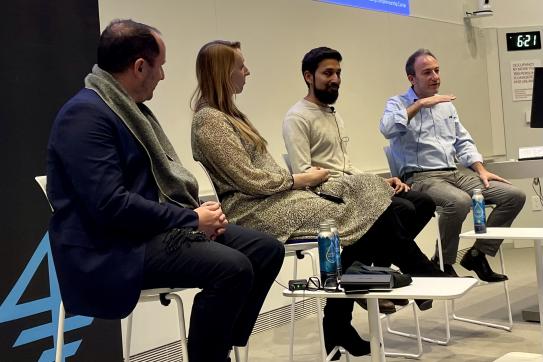The startup landscape of 2023 is nothing like it was in the previous decade — or the previous week, for that matter. New advancements in automation technology have impacted everything from hiring and onboarding to website construction and content management, accelerating innovation but also creating new challenges for founders.
These challenges were the focus of the first event in Columbia Business School’s Startups Week series, a multi-day exploration of innovation hosted by the Eugene M. Lang Entrepreneurship Center. The panel was moderated by Jeremy Kagan, an adjunct marketing professor at CBS, a managing partner at Textbook Ventures, and the former managing director of the Lang Center.
Experts from both the startup and investor sides of the industry discussed the most useful AI and non-AI tech tools, future trends, as well as the challenges and opportunities founders face thanks in part to the rapidly changing world of tech.
For starters, tech has foundationally altered the formerly tedious building process startups once had to contend with. It wasn’t too long ago that founders had to hire employees, secure office space, and obtain a server before launching a company. Now, thanks to tools like Stripe and Amazon Web Services, building up the digital, physical, and workflow side of a startup is quicker and more accessible than ever.
“In terms of AI, now you can do a lot more content all at once,” said Masha Titova, chief marketing officer at GoCharlie, an AI assistant content creation company. “Instead of having to switch through multiple platforms, you can be a lot more efficient.”
The panelists praised new AI tools like GitHub Copilot and Visily, as well as non-AI tools like WebFlow and Bubble.io, for making the user interface and website development process smoother. Tools like Whale, Tome, and Gamma were also recommended to help with onboarding and pitch deck creation.
However, this ease of access creates a catch-22, according to Titova: With the barrier to entry so low, competition has increased “exponentially” in recent months. “You really have to be good at what you're trying to do, even if the foundational stuff is easier to set up,” she added.
As adoption of these tools becomes more widespread, domain knowledge will likely stand out more among founders and their teams, according to Joshua Noronha ’24, a CBS MBA student and co-founder of RecoGecko, an automation service for the hostel industry. He also shared his experience of working on a mental health startup that made use of GPT-3, a predecessor of ChatGPT.
While Noronha said his team found the AI tools helpful, he stressed that having an human expert onboard was critical: “Domain knowledge becomes that much more important now, because while the AI seems smart, it can be misguided, and that’s where you need that domain expert to really separate the wheat from the chaff.”
In noting the limitations of new AI and general tech, the panelists cautioned inexperienced founders not to rely on it too heavily for mission-critical components of their business. “If it’s mission critical, that’s the core. That’s what your customers really want,” said Omri Shacham, managing partner at Elliptic Ventures, an early-stage VC fund that invests in deep tech. He emphasized that founders should look to outsource most non-core skills to AI tools in order to move faster.
As easy as it is for founders to rely on new tech, it’s critical to know when not to rely on it too heavily, especially AI tools, which the panelists agreed can’t yet replace creativity.
“What AI and tech are still lacking is that creativity. You still need people that are going to be doing things outside of the box,” said Titova. “At the end of the day, in-person events are still really big for companies, and an AI robot’s not going to be hosting your party.”
Asked about the future of startup tech, the panelists agreed there is still a ways to go before AI assistants are able to fully replace interns or CTOs. They agreed the startup job market will be impacted, however, as founders attempt to outsource repetitive roles to tech. Still, human-generated content will always be in demand.
“We have cameras. We have Photoshop,” Titova said. “But there are still painters.”
